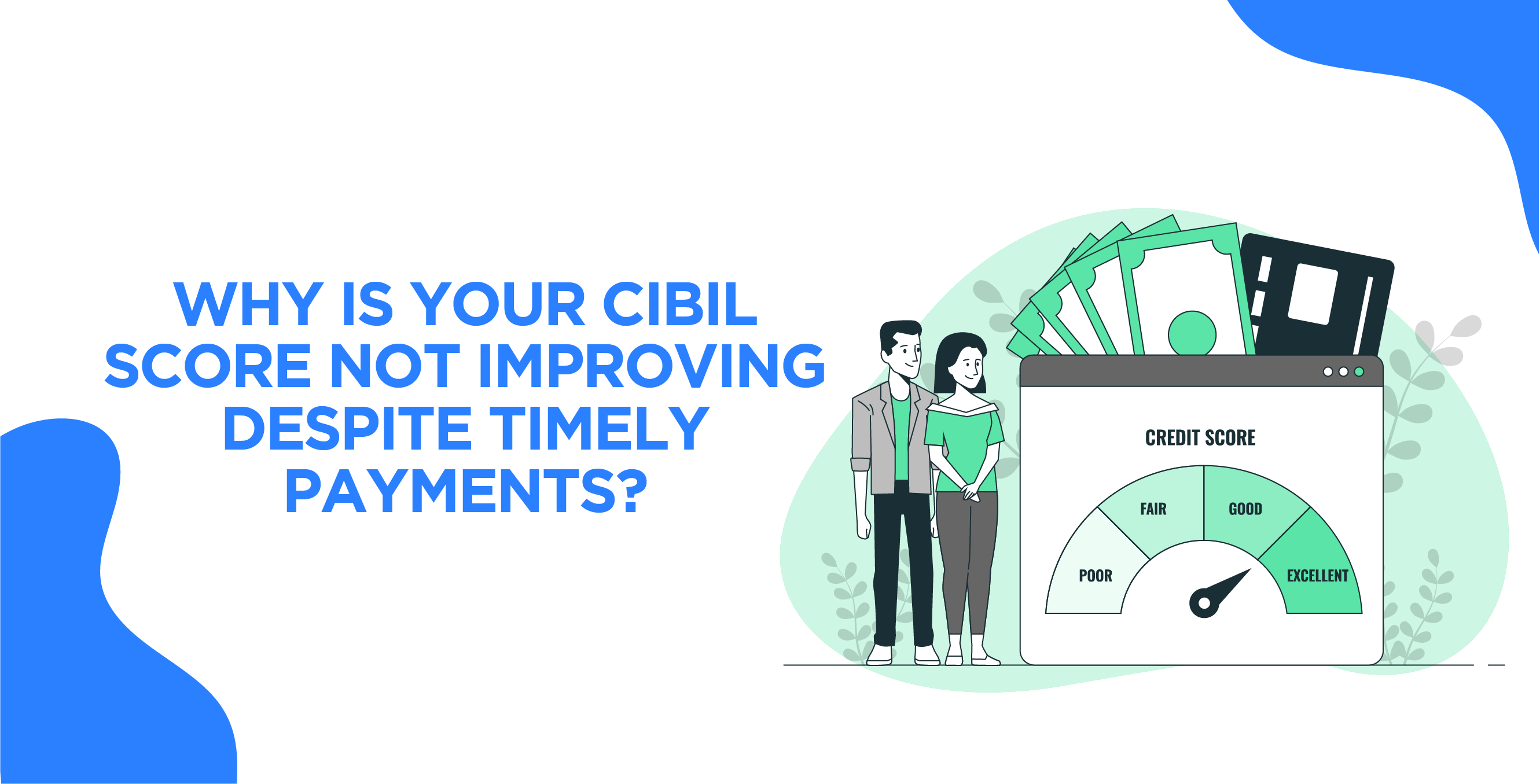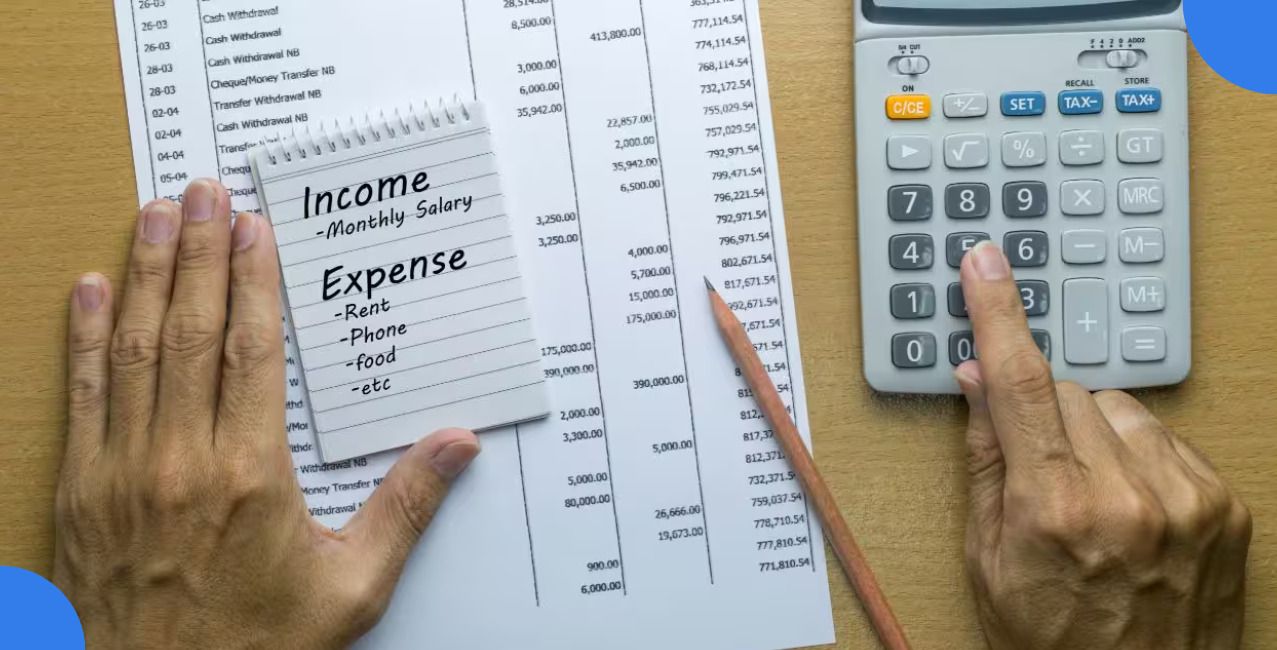Why Is Your CIBIL Score Not Improving Despite Timely Payments?

Check Your Loan Eligibility Now
By continuing, you agree to LoansJagat's Credit Report Terms of Use, Terms and Conditions, Privacy Policy, and authorize contact via Call, SMS, Email, or WhatsApp
"Maine sab time pe kiya tha, fir bhi score neeche kyun hai?" — Sneha was so
upset.
She's 27, from Pune, and is in marketing. She has a credit card with a limit of ₹50,000 and settles the entire bill each month. She also has a personal loan amounting to ₹2,00,000 and settles her ₹6,500 EMI on time, every month without any defaults!
Therefore, when she went to check her CIBIL score and found it to be just 662, she was left stunned. Even worse, her home loan was rejected.
Sneha thought paying on time was enough, but it turns out there’s more to your credit score than just timely payments.
Let's understand this further, starting with the first mistake that most people do not even realise they are making!
Sirf Personal Loan Se Kaam Nahi Chalega, Thoda Mix Bhi Zaroori Hai
Even if you are paying your EMIs on time, if all your loans are unsecured, like credit cards or personal loans, your credit profile may appear risky.
For example, Sneha has a ₹2,00,000 personal loan and a credit card with a ₹50,000 limit, both smoothly running. But she's never taken a secured loan, such as a car loan or home loan. That's why, despite having zero late payments, her CIBIL score remains stuck at 662.
CIBIL likes to see a healthy mix—secured + unsecured loans. Having too much of one kind (particularly unsecured) can adversely affect your score without you even realising it.
Swiped Too Much? Score Might Swipe Left!
Being within your credit card limit seems responsible, but spending a lot of it can silently damage your CIBIL score.
Let us meet Apoorva, a 29-year-old Bengaluru-based architect. Her credit card limit was ₹1,00,000, and she used ₹90,000 each month, clearing it before the due date.
She believed she was being clever — no minimum payments, no interest fees. But her credit score remained stuck at 674.
Why? Because her credit utilisation ratio was too high, 90% every month. Lenders prefer responsible usage, not cards maxed out.
This is how her usage looked:
Month | Credit Limit | Amount Spent | Utilisation | Payment Status | CIBIL Impact |
January | ₹1,00,000 | ₹90,000 | 90% | Paid in Full | Negative |
February | ₹1,00,000 | ₹25,000 | 25% | Paid in Full | Positive |
Smart Tip: Always strive to spend under 30% of your credit limit. It's not how much you repay – it's how much you spend.
Bro, You're Still a Newbie – No Credit History? No Problem!
If you're new to credit, your score will take time to establish. Just like learning a new skill, it does not happen overnight. If you've only been making payments on credit for approximately 1 to 2 years, your score is still in the "new" category, even if you've paid each payment on time.
For example, Tanya received her first credit card with a limit of ₹25,000 12 months ago. She has been paying off the
card in full each month, but even then, her CIBIL score remains at 650.
She was confused at first, but it’s normal. It just takes time for your credit score to reflect all your hard work.
Let us examine her journey over 12 months:
Period | Credit Card Limit | Amount Spent (monthly) | Utilisation | CIBIL Score |
First 3 Months | ₹25,000 | ₹10,000 | 40% | 620 |
6 Months | ₹25,000 | ₹5,000 | 20% | 640 |
12 Months | ₹25,000 | ₹2,000 | 8% | 650 |
Key Point: Tanya's score is getting better, but it'll be at least 2 years before it increases seriously.
Too Many Loans? Try Debt Consolidation to Clean Things Up
It combines your several outstanding debts into a new loan with a single monthly payment and a reduced interest rate to help you lower your financial stress.
Now, you might think, “I’m paying on time, so why isn’t my score improving?”
Too many loans can still hurt your score. It shows over-reliance on credit, which makes lenders cautious.
Let's take Aarti, a 30-year-old designer from Pune, who was dealing with this exact issue.
Before Consolidation
Loan Type | Amount | Monthly EMI | Interest Rate |
Personal Loan | ₹2,00,000 | ₹6,000 | 14% |
Credit Card Dues | ₹1,00,000 | ₹4,000 | 18% |
Education Loan | ₹3,00,000 | ₹8,000 | 12% |
Total | ₹6,00,000 | ₹18,000 | Varied |
Even with timely payments, her credit score stayed stuck at 670, thanks to too many active accounts and a high EMI burden.
After Consolidation
Loan Type | Amount | Monthly EMI | Interest Rate |
Consolidated Loan | ₹6,00,000 | ₹15,000 | 11% |
Within 3 months, her score jumped to 715 — just by simplifying her credit profile.
Frequent Enquiries = “Thirsty” Credit Behaviour
When you apply for loans or credit cards, lenders perform enquiries on your credit report. There are two types:
Hard Enquiries: These occur when you apply for credit (personal loans, credit cards, etc.). They impact your CIBIL score.
Soft Enquiries: These happen when you check your eligibility or get pre-approved offers. These do not impact your score.
Now, let’s see how Nisha's score changed when she used both types of enquiries:
Loan Type | Before (Hard Enquiries) | After (Soft Enquiries) | CIBIL Score |
Personal Loan | ₹2,00,000 (Applied) | ₹2,00,000 (Pre-approved) | 670 |
Credit Card | ₹50,000 (Applied) | ₹50,000 (Pre-approved) | 670 |
BNPL Scheme | ₹15,000 (Applied) | ₹15,000 (Pre-approved) | 670 |
Total Enquiries | 3 Hard Enquiries | 3 Soft Enquiries | 670 —> 720 |
Tip:
To protect your credit score, opt for soft enquiries (like pre-approved offers or eligibility checks) instead of hard enquiries. These won’t affect your score!
Conclusion
To wrap it up, improving your CIBIL score goes beyond just paying on time. It’s about balancing your credit mix, managing how much you spend, and being smart about the enquiries you make. Get these right, and you’ll see your score climb!
FAQs
- Does checking my own CIBIL score reduce it?
No, self-checks don’t impact your score.
- Why is my score not improving despite no new loans?
Lack of active credit usage can hold back your score.
Other Informative Pages | |||
Should You Close Old Credit Cards to Improve Your Credit Score | |||
About the author

LoansJagat Team
Contributor‘Simplify Finance for Everyone.’ This is the common goal of our team, as we try to explain any topic with relatable examples. From personal to business finance, managing EMIs to becoming debt-free, we do extensive research on each and every parameter, so you don’t have to. Scroll up and have a look at what 15+ years of experience in the BFSI sector looks like.
Subscribe Now
Related Blog Post

Salaried vs. Self-Employed: Who Gets a Personal Loan Faster in 2025?

Too Many EMIs? What to Do When Monthly Payments Become Unmanageable

Post Office Customer Care Number: Helpline & Support
Recent Blogs
All Topics
Contents
Quick Apply Loan
Consolidate your debts into one easy EMI.
Takes less than 2 minutes. No paperwork.
10 Lakhs+
Trusted Customers
2000 Cr+
Loans Disbursed
4.7/5
Google Reviews
20+
Banks & NBFCs Offers
Other services mentioned in this article





